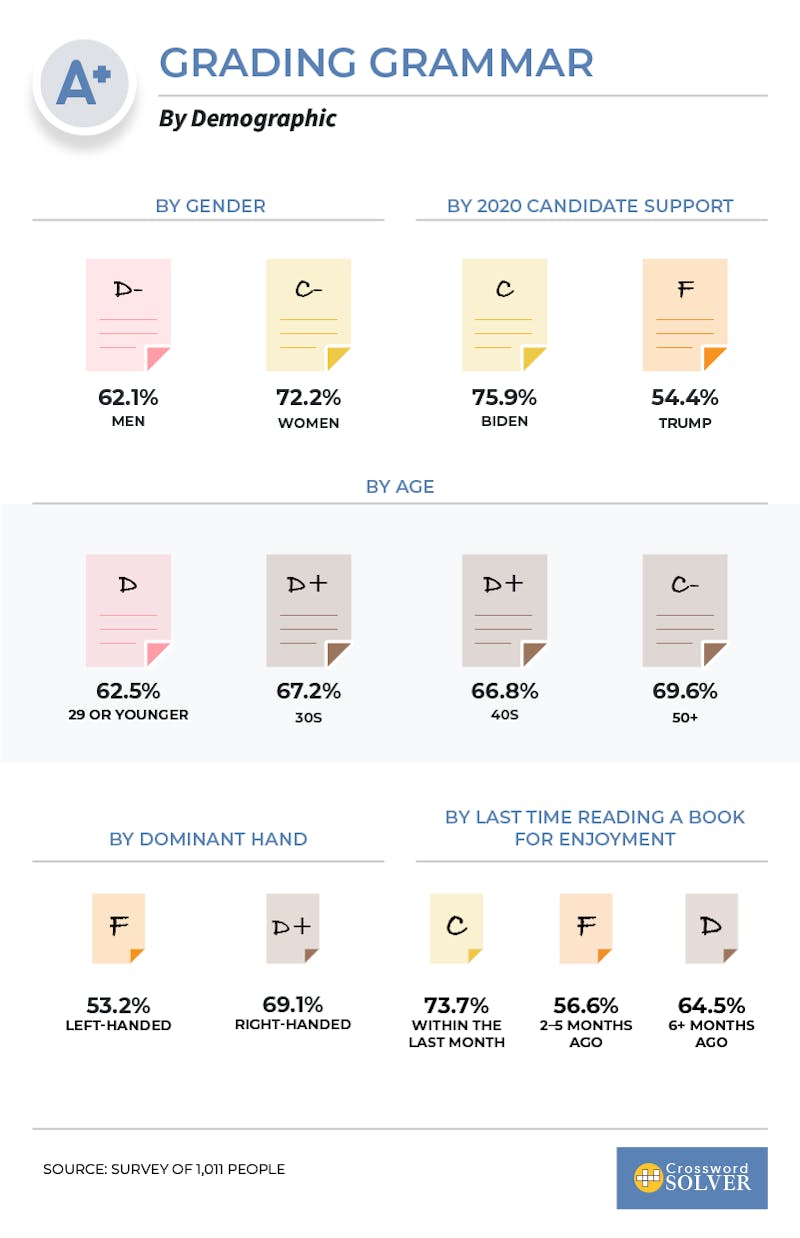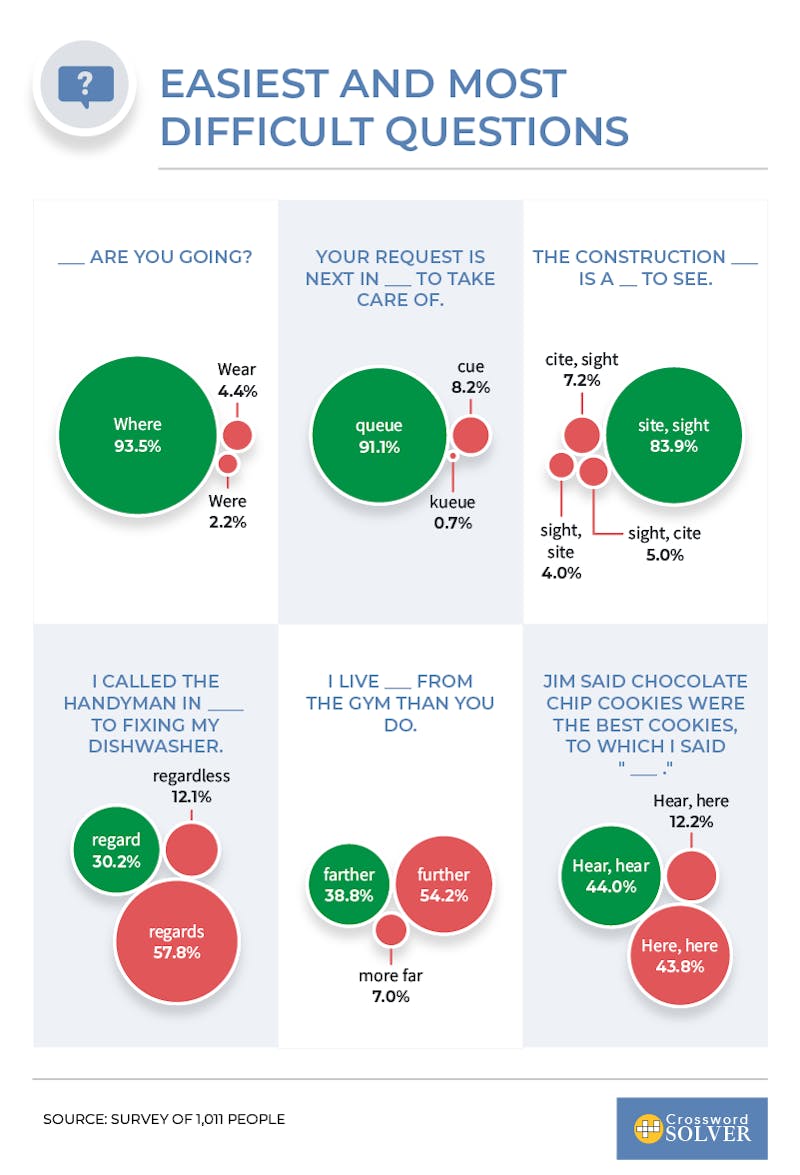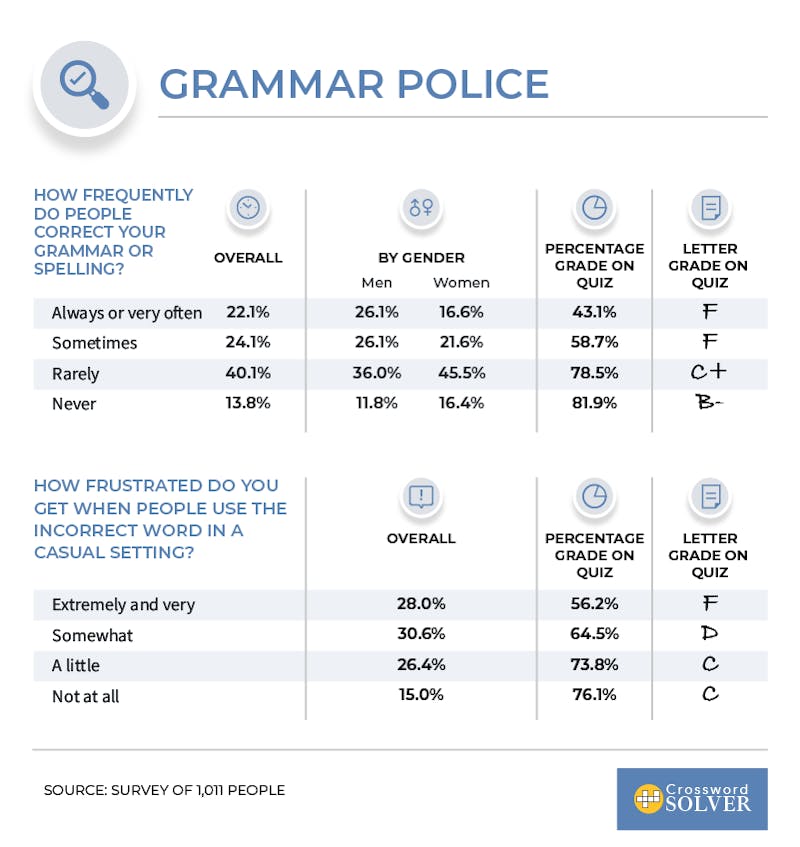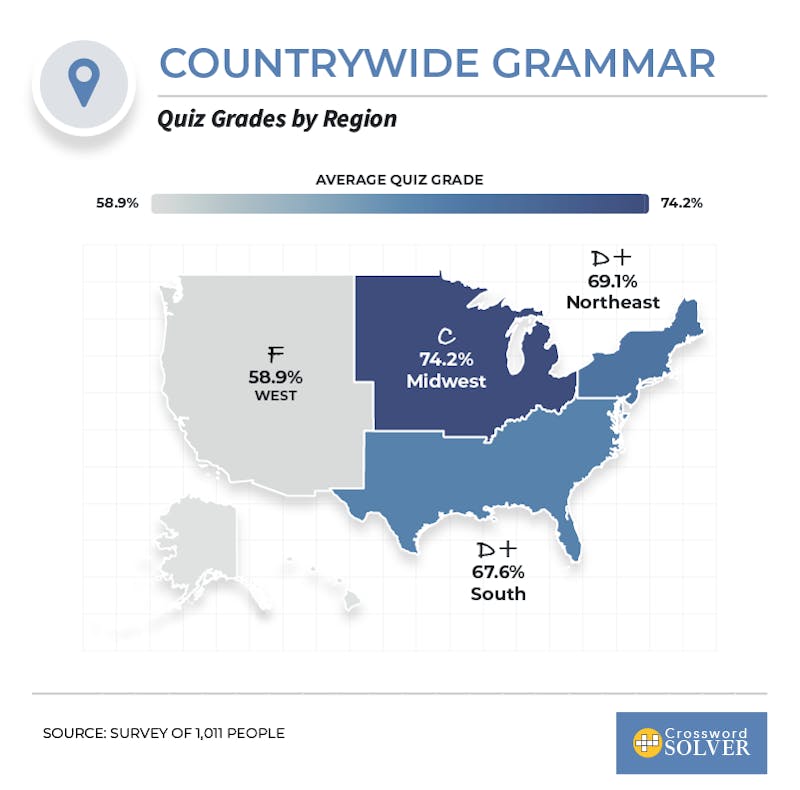America's Grammar and Spelling Acumen
Quizzing Americans on English Language Knowledge

Despite differences in age, gender, generation, education, political affiliation, or hometown, there is one thing that many people struggle with all the same: the English language.
Even professional writers find themselves misusing words and phrases and resort to proofreaders in order to make sure the message they are trying to get across is clear and correct before their readers get their hands on it. Speaking and writing with proper English is important, not only in the professional world but in our everyday lives as well.
We thought it would be interesting to put over 1,000 different people to the test using a quiz-style survey to truly see what they know (and don’t) when it comes to English language standards.
Going Back to Grammar School

It doesn’t matter whether you’re an English teacher, a crossword puzzle genius, or even if you have a college degree, human error is part of life. This becomes even more evident as we see that the average quiz grade of survey respondents was the equivalent of a D. Only roughly 16% scored 90 points or higher, which is equivalent to a letter grade of an A or A-.
Even though one of 2019’s top five most popular online college majors was Communications and Media, which incorporates many of the same teachings as an English major, people are still misusing words and phrases on a regular basis. What’s worse is that some might not even realize their mistakes.
Who Made the Grade?

Although the average test scores were relatively low across the board regardless of gender, age, politics, and other defining characteristics, there are a few differences that stand out.
For example, respondents who leisurely read a book within one month of taking the survey scored much higher than those who hadn’t read for entertainment in the past two to five months. Reading is essentially exercise for our brains. By reading more, we are building muscle within the brain to increase its potential to absorb and retain information. People who read more are constantly exposing themselves to words and phrases outside of their everyday conversations. Research has shown that people learn about 5% to 15% of all the words they know through reading.
There was also a noticeable difference between the scores of men and women – female respondents generally scored higher. Women are said to be better at remembering verbal information, such as words and sentences, and therefore may have a better understanding of what’s grammatically correct versus incorrect.
The largest gap between scores occurred between respondents with differing political affiliations. Biden supporters scored an average of a C, while Trump supporters’ overall score fell well below failing.
Easy Street

There were some questions that the majority of respondents all guessed accurately, e.g., identifying the correct usage of where versus wear, and queue versus cue. These two, specifically, were answered correctly by over 90% of respondents. It could be that because these words, and the way they were phrased on the quiz, are more standard in normal conversation, and respondents could use context clues if they did not already know the answer.
The hardest phrase, however, proved to be “in regard to.” Over half of respondents believed the word ‘regard’ to be plural, providing their answer as ‘regards.’
Getting Schooled

There are some people who never fail to take advantage of a moment to correct someone’s grammar. Those “grammar police” can get frustrated when they hear other people speak incorrectly while in conversation (or sometimes just within earshot). What’s interesting, though, is that the respondents who said they get extremely frustrated by this, actually scored the lowest on their grammar quiz. Those who got the highest scores were rarely annoyed by this at all.
Men are corrected more than women, and those whose scores were the lowest reported being very frequently corrected on their grammar by others.
Which State Said It Best

We’ve seen how gender, age, and determinants like political affiliation and frequency of reading affected respondents’ scores, and now we look to where these respondents reside. Overall, people who live in Midwestern states scored the highest, a C average, while West Coast residents failed, scoring less than 60%.
While we did find that certain factors played a part in who scored better, it’s safe to say that people are still finding themselves confused by certain words and phrases in the English language. In the end, there are some grammatical scenarios that the majority of people do recognize and know well, but, overall, there remain many language situations that continue to confuse even the best of us.
Methodology and Limitations
We quizzed 1,011 people on various spelling and word choice questions using the Amazon MTurk service. We asked 23 questions and then looked at how many questions people got correct to determine their “letter” score. The ranges for letter scores are as follows:
A: 93–100
A-: 90–92
B+: 87–89
B: 83–86
B-: 80–82
C+: 77–79
C: 73–76
C-: 70–72
D+: 67–69
D: 63–66
D-: 60–62
F: Below 60
Among respondents, there were 586 men, 422 women, and three people identifying as nonbinary. The average age of respondents was 39.1 with a standard deviation of 12.4.
This study relies on self-reporting and has not been weighted. Self-reported data can be host to issues, such as telescoping and recency bias. The information found in this study should be considered for exploratory purposes only.
Fair Use Statement
If you or someone you know is interested in how well our general public understands and uses the English language, please feel free to share this information for noncommercial purposes. All we ask is that you give us credit by linking back to our study.
Recent Clues
- Part of brutal routine Crossword Clue
- Table supports Crossword Clue
- 20 per cent off lightweight fabric article; there it is! Crossword Clue
- Bad news about one scoundrel (5) Crossword Clue
- *Armed thieves Crossword Clue
- Monotonous Crossword Clue
- Snub Crossword Clue
- Heard you had arduous journey in Dutch city? Crossword Clue
- Hitting with can (3) Crossword Clue
- Eminem's genre Crossword Clue
- Body of water Crossword Clue
- The good ___ days Crossword Clue
- Fidel ____, Cuban leader Crossword Clue
- Awareness of unusual things one wears Crossword Clue
- General name on a Chinese menu Crossword Clue
- Animal of a breed of large white beef cattle that originated around Charolles in France (9) Crossword Clue
- Slyness Crossword Clue
- Bird of prey Crossword Clue
- Creamy white Crossword Clue
- Blotter target Crossword Clue
- European volcano (4) Crossword Clue
- "___ was saying...": 2 wds. Crossword Clue
- Fruit-filled pastry Crossword Clue
- Top-__ list Crossword Clue
- Unwholesome gas to release around outlet? Crossword Clue
- "___ Majesty," the Queen Crossword Clue
- Moving at speed Crossword Clue
- Partner to brush scattered sand up, about time! Crossword Clue
- Athlete - and a gun/drug smuggler (6) Crossword Clue
- P.R. buzz Crossword Clue
- Went quickly over part for recital Crossword Clue
- Curved shape different outside boundary Crossword Clue
- "How obvious!" Crossword Clue
- Love to bother engineers (5) Crossword Clue
- Really good; £1,000 Crossword Clue
- Process of burning (10) Crossword Clue
- This Simpsons character goes both ways (4) Crossword Clue
- Travels by bicycle (6) Crossword Clue
- Water near Detroit Crossword Clue
- 1940 conflict Crossword Clue
- Music-playing Apple device Crossword Clue
- Image file type: Abbr. Crossword Clue
- Catch in one trap (3) Crossword Clue
- Retired track and field sprinter Tyson Crossword Clue
- Divine being Crossword Clue
- Stew-making vessel Crossword Clue
- Run around centre of Livery Hall and tour Mayfair, say (7,3) Crossword Clue
- Wise words Crossword Clue
- Eight-time Olympic gold medalist Bolt Crossword Clue
- Stand __ Crossword Clue
Trending Clues
- One-named artist who sang the U.S. national anthem at the Paris Olympics closing ceremony Crossword Clue
- 101 course Crossword Clue
- Soaked through Crossword Clue
- Throat tissues Crossword Clue
- San Diego suburb Crossword Clue
- Tim ___, American baseball outfielder Crossword Clue
- US singer/songwriter/musician (1915-2009) who has a guitar named after him Crossword Clue
- Estrange Crossword Clue
- Alcoholic pastry Crossword Clue
- Wizard's ___, magical variant of a classical board game played at Hogwarts in which pieces move of their own accord on the player's command Crossword Clue
- Winning hit at Wimbledon, maybe Crossword Clue
- Prophetic Crossword Clue
- Helpful social connections Crossword Clue
- Always there Crossword Clue
- State as fact Crossword Clue
- Choreograph Crossword Clue
- Second chance Crossword Clue
- Member of SW Asian ethnic group Crossword Clue
- Pigged out (on), as in food slang Crossword Clue
- Typewriter feature Crossword Clue
- Linesman in rugby (5,5) Crossword Clue
- Law enforcer in Leicester Crossword Clue
- Contest Crossword Clue
- Musty-smelling Crossword Clue
- Put off (11) Crossword Clue
- Pee Wee of baseball Crossword Clue
- Behave harshly towards (4,2) Crossword Clue
- Oversaw, as a Discord server Crossword Clue
- Comedian Gillis Crossword Clue
- Number (5) Crossword Clue
- Puma's pad? Crossword Clue
- Was a snitch for Crossword Clue
- Bring shame upon Crossword Clue
- Citrus drink suffix Crossword Clue
- Totes absurd Crossword Clue
- Remove from power Crossword Clue
- Cowboys QB-turned-broadcaster Tony Crossword Clue
- Rang out Crossword Clue
- "Blitzkrieg Bop" band Crossword Clue
- "That's enough out of you!" Crossword Clue
- Big Dutch bank Crossword Clue
- Casual Italian restaurant Crossword Clue
- Endures Crossword Clue
- Performs at a Thunderbirds show Crossword Clue
- Golf gimme Crossword Clue
- Woodworking machine Crossword Clue
- One of 120 found in Super Mario 64 ... even though the game could be completed without obtaining a single one Crossword Clue
- Off the mark or track, say Crossword Clue
- Real genius Crossword Clue
- Den Crossword Clue